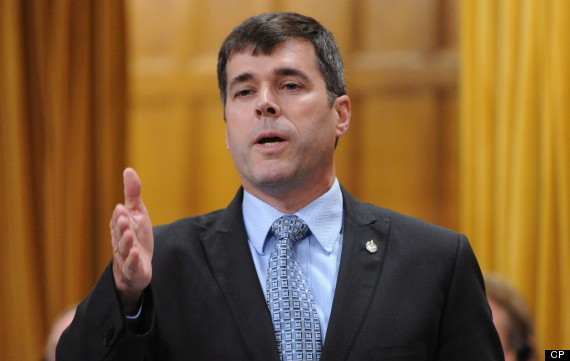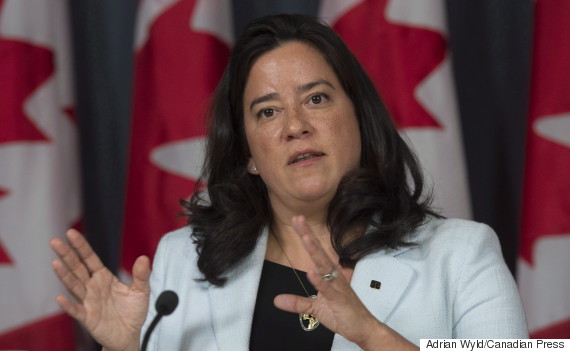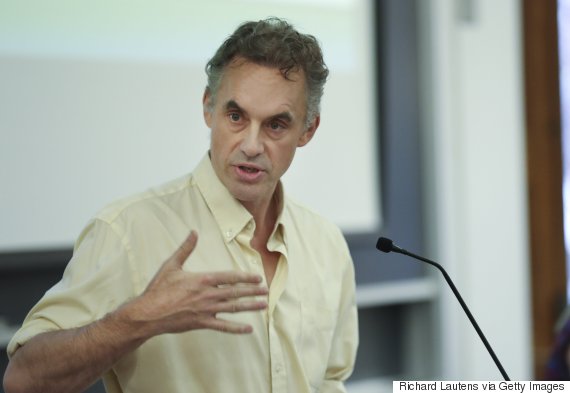OTTAWA — Conservative leadership candidate Pierre Lemieux is lashing out at what he calls “chronic political correctness,” saying Canadians shouldn’t be forced to refer to transgender individuals with gender-neutral pronouns or face fines and other penalties.
“Freedom of speech in Canada is under attack,” Lemieux said in a news release Monday. “Protection from discrimination is entirely different from not wanting to be offended. Chronic political correctness is strangling free and respectful debate in Canada and it has to stop.”
The former Ontario MP, who was defeated in the 2015 federal election, pledged to scrap Bill C-16 if he is elected Tory leader and forms government. The Liberal legislation, currently in front of the Senate, extends protection to the transgender community through the Criminal Code and the Canadian Human Rights Act by recognizing gender identity and gender expression as grounds for discrimination.
Lemieux refused to say why he is opposed to using alternative pronouns such as ‘they’ in the singular form to refer to a trans person if they request it. “This isn’t about me,” he told The Huffington Post Canada.
![pierre lemieux]()
Pierre Lemieux speaks in the House of Commons in 2012.
But Jack Fonseca, a senior political strategist with the social conservative Campaign Life Coalition, said he believes Bill C-16 will bring “raw persecution” of Christians and people of other faiths.
“It is a draconian law that requires people to say certain words that they don't believe in — that even contradicts their conscience,” he told HuffPost. “If you believe that there are only two sexes, male and female, and you are required to affirm the philosophical idea that there are multiple genders… you are being required to violate your conscience and, in some cases, your moral beliefs and religious beliefs.”
The Liberal party, the NDP and a majority of the Conservative caucus in the House voted in favour of C-16. Of the 40 Tories who stood opposed, only two have become leadership candidates: Saskatchewan MPs Brad Trost and Andrew Scheer.
Justice Minister Jody Wilson-Raybould said the bill aims to ensure equal protection to trans and gender-diverse Canadians under both human rights law and criminal law.
“This bill is not about limiting freedoms, but expanding them for all Canadians,” she told HuffPost in an email. “Discrimination undermines an individual’s freedom to build a stable and successful future and deprives us all of their participation in our society.”
![jody wilson raybould]()
Minister of Justice and Attorney General of Canada Jody Wilson-Raybould responds to a question on April 14, 2016 in Ottawa.
In the Commons last October, the minister noted that with this bill, the government was saying “loudly and clearly that it is time to move beyond mere tolerance of trans people. It is time for their full acceptance and inclusion in Canadian society.”
'A sword for militant radical activists'
Fonseca, however, insisted that the bill, rather than being a “shield” for those who identify as transgender, will instead become “a sword for militant radical activists to go after Christians and make them pay for opposing this ideology.
“If this dangerous bill is passed, we will see Christians’ lives ruined,” he said. “We will see them lose their jobs, their homes. Their reputations will be destroyed. We will see Christians be buried under ruinous financial debt as a means to silence them and send an example to others…. We will see people being jailed.”
While Lemieux believes the law’s goal is to intimidate Canadians, he told HuffPost he doesn’t think it will lead to incarceration.
In his news release, however, he quoted University of Toronto Professor Jordan Peterson saying just that: “It is wrong to jail someone for holding different attitudes or beliefs, or for simply refusing to use specific words on demand in a free society.”
![jordan peterson]()
Jordan Peterson speaks at the University of Toronto.
Peterson garnered national headlines last fall when he spoke out against the use of alternative pronouns such as ‘they,’ ‘ze’ or ‘zir’ for trans individuals.
Peterson told HuffPost he believes the legislation could land someone in jail if they refuse to pay a fine or penalties such as legal costs and are subsequently held in contempt of the court.
He and Lemieux both pointed to a comment by Ontario Chief Human Rights Commissioner Renu Mandhane that refusing to address a trans person by their chosen name and a personal pronoun that matches their gender identity would be discriminatory if it occurred in a public area covered by the code, such as a university setting.
On its website, the commission states that using “right terms” can be used to affirm identities and challenge discriminatory attitudes, while “wrong ones” can disempower, demean and reinforce exclusion.
“This is as true today for non-binary gender pronouns like 'they' as it was for the evolution of the feminist movement and the use of the term “Ms” or a married woman’s maiden name.”
While the Ontario Human Rights Code, like Bill C-16, does not specify the use of any particular pronoun or other terminology, the Ontario Commission specifically states that provincial law recognizes “misgendering” as a form of discrimination.
The federal legislation speaks only about gender identity and expression, although Wilson-Raybould noted that courts across the country have been interpreting "gender identity" and "gender expression" for many years and in hundreds of cases.
“We will look at all Canadian jurisdictions, including Ontario, for guidance on how to interpret these terms,” she wrote.
The government’s news release defines “gender identity” as a person’s sense of being a woman, a man, both, neither, or anywhere along the gender spectrum, while “gender expression” is how a person publicly presents their gender, such as through their dress, hair, makeup, body language and voice.
Lemieux calls it 'forced speech'
As prime minister, Lemieux said, he would strike a new legislative committee and ask Peterson to review all laws governing speech.
“My message is quite clear: In Canada, we celebrate free speech not forced speech,” he said.
Egale Canada, a charity that promotes lesbian, gay, bisexual, and trans (LGBT) human rights, did not return requests for comment.
“Freedom of speech in Canada is under attack,” Lemieux said in a news release Monday. “Protection from discrimination is entirely different from not wanting to be offended. Chronic political correctness is strangling free and respectful debate in Canada and it has to stop.”
The former Ontario MP, who was defeated in the 2015 federal election, pledged to scrap Bill C-16 if he is elected Tory leader and forms government. The Liberal legislation, currently in front of the Senate, extends protection to the transgender community through the Criminal Code and the Canadian Human Rights Act by recognizing gender identity and gender expression as grounds for discrimination.
Lemieux refused to say why he is opposed to using alternative pronouns such as ‘they’ in the singular form to refer to a trans person if they request it. “This isn’t about me,” he told The Huffington Post Canada.

Pierre Lemieux speaks in the House of Commons in 2012.
But Jack Fonseca, a senior political strategist with the social conservative Campaign Life Coalition, said he believes Bill C-16 will bring “raw persecution” of Christians and people of other faiths.
“It is a draconian law that requires people to say certain words that they don't believe in — that even contradicts their conscience,” he told HuffPost. “If you believe that there are only two sexes, male and female, and you are required to affirm the philosophical idea that there are multiple genders… you are being required to violate your conscience and, in some cases, your moral beliefs and religious beliefs.”
“Freedom of speech in Canada is under attack."
The Liberal party, the NDP and a majority of the Conservative caucus in the House voted in favour of C-16. Of the 40 Tories who stood opposed, only two have become leadership candidates: Saskatchewan MPs Brad Trost and Andrew Scheer.
Justice Minister Jody Wilson-Raybould said the bill aims to ensure equal protection to trans and gender-diverse Canadians under both human rights law and criminal law.
“This bill is not about limiting freedoms, but expanding them for all Canadians,” she told HuffPost in an email. “Discrimination undermines an individual’s freedom to build a stable and successful future and deprives us all of their participation in our society.”

Minister of Justice and Attorney General of Canada Jody Wilson-Raybould responds to a question on April 14, 2016 in Ottawa.
In the Commons last October, the minister noted that with this bill, the government was saying “loudly and clearly that it is time to move beyond mere tolerance of trans people. It is time for their full acceptance and inclusion in Canadian society.”
'A sword for militant radical activists'
Fonseca, however, insisted that the bill, rather than being a “shield” for those who identify as transgender, will instead become “a sword for militant radical activists to go after Christians and make them pay for opposing this ideology.
“If this dangerous bill is passed, we will see Christians’ lives ruined,” he said. “We will see them lose their jobs, their homes. Their reputations will be destroyed. We will see Christians be buried under ruinous financial debt as a means to silence them and send an example to others…. We will see people being jailed.”
While Lemieux believes the law’s goal is to intimidate Canadians, he told HuffPost he doesn’t think it will lead to incarceration.
In his news release, however, he quoted University of Toronto Professor Jordan Peterson saying just that: “It is wrong to jail someone for holding different attitudes or beliefs, or for simply refusing to use specific words on demand in a free society.”

Jordan Peterson speaks at the University of Toronto.
Peterson garnered national headlines last fall when he spoke out against the use of alternative pronouns such as ‘they,’ ‘ze’ or ‘zir’ for trans individuals.
Peterson told HuffPost he believes the legislation could land someone in jail if they refuse to pay a fine or penalties such as legal costs and are subsequently held in contempt of the court.
He and Lemieux both pointed to a comment by Ontario Chief Human Rights Commissioner Renu Mandhane that refusing to address a trans person by their chosen name and a personal pronoun that matches their gender identity would be discriminatory if it occurred in a public area covered by the code, such as a university setting.
“This is as true today for non-binary gender pronouns like 'they' as it was for the evolution of the feminist movement..."
On its website, the commission states that using “right terms” can be used to affirm identities and challenge discriminatory attitudes, while “wrong ones” can disempower, demean and reinforce exclusion.
“This is as true today for non-binary gender pronouns like 'they' as it was for the evolution of the feminist movement and the use of the term “Ms” or a married woman’s maiden name.”
While the Ontario Human Rights Code, like Bill C-16, does not specify the use of any particular pronoun or other terminology, the Ontario Commission specifically states that provincial law recognizes “misgendering” as a form of discrimination.
The federal legislation speaks only about gender identity and expression, although Wilson-Raybould noted that courts across the country have been interpreting "gender identity" and "gender expression" for many years and in hundreds of cases.
“We will look at all Canadian jurisdictions, including Ontario, for guidance on how to interpret these terms,” she wrote.
The government’s news release defines “gender identity” as a person’s sense of being a woman, a man, both, neither, or anywhere along the gender spectrum, while “gender expression” is how a person publicly presents their gender, such as through their dress, hair, makeup, body language and voice.
Lemieux calls it 'forced speech'
As prime minister, Lemieux said, he would strike a new legislative committee and ask Peterson to review all laws governing speech.
“My message is quite clear: In Canada, we celebrate free speech not forced speech,” he said.
Egale Canada, a charity that promotes lesbian, gay, bisexual, and trans (LGBT) human rights, did not return requests for comment.
-- This feed and its contents are the property of The Huffington Post, and use is subject to our terms. It may be used for personal consumption, but may not be distributed on a website.